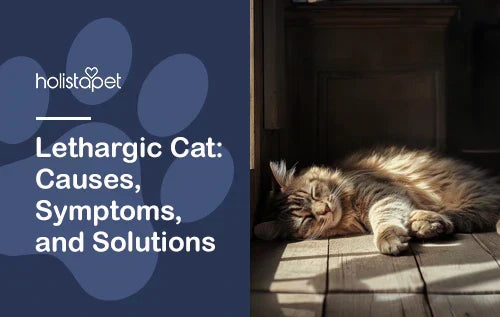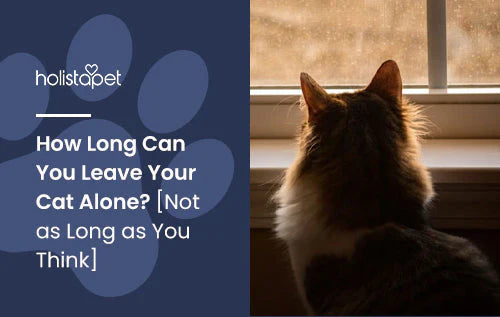A lethargic cat isn't just a sleepy kitty; it's a red flag! If your feline friend's behavior suddenly changes and they seem sluggish, something could be going on. Whether it's a temporary dip in energy or a sign of something more serious, it's time to pay attention to your cat's lethargy.
What Is Lethargy in Cats?

Lethargy in cats is when they show signs of low energy or lack of interest in their usual activities. A lethargic kitty may sleep more than usual or seem uninterested in play, food, or even socializing.
It's often a warning sign that something's off, maybe from a minor issue or a more serious health concern. If this tired behavior persists, a trip to the vet might be in order.
Related Post: How Many Hours A Day Does A Cat Sleep?
What Are the Common Signs of Lethargy?
When a cat is feeling lethargic, the signs can be pretty obvious. You might notice:
- Lack of Activity. Your kitty suddenly avoids playing or moving around.
- Poor Appetite. They may skip meals or show no interest in food.
- Excessive Sleeping. Sleeping more than usual, even during the day.
- Abnormal Behavior. They might become more withdrawn or irritable.
- Decreased Grooming. Their usual self-care routine may take a hit.
Differentiating Between Tiredness and True Lethargy
It's important to know when your cat is just a little tired versus when they're truly lethargic. Tiredness is normal, but true lethargy often signals an underlying problem.
A tired cat may perk up with rest, but a lethargic cat stays unusually still, has little energy, and shows other symptoms like poor appetite or behavior changes. If your cat's lethargy worsens or lasts longer than a day or two, it's worth getting your cat examined.
Common Causes of Lethargy in Cats
What turns a cat lethargic? There are a variety of causes, ranging from environmental changes to serious health issues. While it's not always a cause for immediate panic, it's important to pay attention to the signs. Let's talk about what could be causing your kitty to turn sluggish.
Environmental and Emotional Factors
Sometimes, lethargy occurs due to environmental or emotional causes. Here's some of them:
- Stress From Changes in Environment. Moving to a new home or rearranging furniture can be stressful.
- Anxiety or Fear. Loud noises or unfamiliar people can cause anxiety, leading to a tired cat.
- Boredom or Lack of Stimulation. Kitties need mental and physical stimulation to stay active.
- Overheating or Exposure To Extreme Temperatures. Too hot or too cold can drain a cat's energy.
- Lack of Social Interaction or Prolonged Isolation. Felines are social creatures; isolation can make them tired.
- Recent Trauma or Loud Noises. Trauma or sudden noises can affect cats and make them feel anxious and exhausted.
- Introduction of New Pets or People in the Household. New additions can disrupt a cat's routine, causing stress and lethargy.
Health Conditions That May Cause Lethargy
Lethargy can also be a sign of underlying health issues, especially in older cats or sick cats. Here are some potential culprits:
- Acute Issues. Sudden infections or injuries can lead to temporary lethargy.
- Chronic Conditions. Diseases like diabetes, kidney disease, liver disease, and heart disease often cause fatigue.
- Infectious Diseases. Respiratory infections, gastrointestinal infections, Feline Leukemia Virus (FeLV), and Feline Immunodeficiency Virus (FIV) are common causes of lethargy.
- Blood and Immune Disorders. Anemia and parasitic infections can sap energy and decrease your cat's activity level.
- Neurological and Musculoskeletal Issues. Arthritis or neurological disorders can make your cat sluggish.
- Serious Illnesses. Conditions like cancer or hyperthyroidism can significantly affect your cat's energy levels.
Lethargic Cat Not Eating: What Does It Mean?

When a lethargic kitty stops eating, it's a cause for concern for cat owners. A loss of appetite combined with low energy can indicate a cat is feeling unwell or dealing with a more serious health issue. It's best to figure out what's going on before the problem worsens. Let's discuss everything you need to know about appetite loss in our feline friends.
Possible Reasons for Loss of Appetite
Loss of appetite in our companion animals is a common sign that something's wrong. Consider the following:
- Illness or Infection. A cold, stomach upset, or viral and bacterial infections can make your cat lose interest in food.
- Pain or Discomfort. Conditions like arthritis or dental problems can make eating painful.
- Stress or Anxiety. Changes in your cat's environment or daily routine can cause them to stop eating.
- Digestive Issues. An upset stomach, nausea, or constipation can reduce appetite.
- Medication Side Effects. Some medications may affect your cat's appetite.
When To Seek Immediate Veterinary Care
A sudden loss of appetite, combined with other symptoms like vomiting, diarrhea, or extreme fatigue, needs immediate attention. If your cat hasn't eaten for 24 hours or more, it's a clear sign something's wrong.
Severe symptoms, such as dehydration, weight loss, or difficulty breathing, are also cause for concern. If your pet's behavior drastically changes or they become extremely lethargic, call your veterinarian immediately. Also, if your cat has a history of respiratory disease, heart disease, kidney disease, or any chronic condition, the situation may be more urgent.
Young Cat Suddenly Lethargic and Weak: What To Do
While younger cats generally have more energy, any sudden change in their activity level can indicate a health issue. It's important to act quickly to rule out serious problems and get your furry friend the care they need. Is your young kitty suddenly acting out of it? Let's explore the possible reasons and what you can do.
Potential Health Issues in Young Cats
If a young cat becomes lethargic and generally unwell, it could point to several health problems. These include:
- Respiratory Infections. Colds or respiratory infections can make cats feel sluggish and weak.
- Gastrointestinal Issues. Stomach problems, such as vomiting or diarrhea, could lead to lethargy.
- Metabolic Diseases. Conditions like diabetes can affect their energy levels.
- Viral Infections. FeLV or FIV can cause weakness.
- Injuries. Even minor injuries can make young cats feel tired and unwell.
Steps To Assess Your Cat's Condition
If your young cat is suddenly lethargic and weak, assess their condition right away. Follow these steps to help you understand what might be going on:
- Pay attention to any unusual signs like changes in appetite or bathroom habits.
- Look for other signs like fever, vomiting, or difficulty breathing.
- Check your cat's body for any obvious injuries, cuts, or swelling.
- Compare their activity levels to their usual behavior.
- If symptoms persist, contact your veterinarian immediately for an evaluation.
Diagnosing Lethargy in Cats
Diagnosing the cause of a lethargic cat requires a close look at a couple of factors. Here's what your vet might do:
- Veterinary Exams and Tests. A veterinary exam is essential to figure out what's going on. Your vet will likely perform diagnostic tests, including blood work and urine tests, to rule out potential health problems.
- Observing Behavioral and Physical Changes. By observing your cat's physical and behavioral changes, your vet can pinpoint the cause of their lethargy and suggest the best treatment options.
How To Help a Lethargic Cat Recover

Helping a lethargic feline recover starts with providing the right care and comfort. Make sure they're hydrated, well-fed, and in a peaceful environment. Each step you take can make a big difference in boosting their energy and overall well-being. Read on to find out how to help your feline companion feel better.
Providing Proper Nutrition and Hydration
Make sure your cat has access to fresh water at all times and is eating high-quality food that suits their needs. If they're not eating, try offering wet food or a yummy treat to stimulate their appetite. Proper hydration and nutrition will help your pet's body fight off whatever is causing their lack of energy and speed up their recovery.
Ensuring a Calm and Comfortable Environment
Keep your cat's space quiet and free from disturbances that could increase their stress levels. Calming elements like soft bedding and familiar smells can help your furry buddy feel more at ease.
CBD (cannabidiol) products, like those from HolistaPet, can also support relaxation, ease stress, and promote comfort. Our CBD soft chews, hard treats, oils, and capsules for cats can be an excellent option for helping your feline friend find relief while they rest and recover.
Identify and Address Related Health Concerns
If your cat is lethargic, it's important to look at any potential health concerns that might be contributing to their lack of energy. Conditions like kidney disease, liver issues, or respiratory infections can make your cat feel weak and tired.
If your cat has a history of health problems, check in with your vet to assess the situation. Early intervention can help address any serious conditions and get your cat on the path to recovery faster.
Identify and Address Related Environmental and Emotional Factors
Lethargy in cats can also link to environmental and emotional factors, so it's important to consider these when assessing your cat's condition. Stress from changes in their environment, like new pets or people, can cause your kitty to feel drained.
Lack of stimulation or social interaction might also contribute to decreased energy levels. Making sure your cat feels secure and comfortable in their environment can help them feel better. Take steps to reduce stress and provide a peaceful setting to aid their recovery.
Preventing Lethargy in Cats

Preventing lethargy in cats involves creating a healthy, balanced lifestyle that keeps them active and energized. Regular checkups, proper nutrition, and a stimulating environment can all help reduce the chances of your pet becoming lethargic.
When you take action and address potential issues early, you can keep your cat feeling lively and happy. Let's dive into the key steps you can take to keep your furry friend's energy levels high.
Regular Veterinary Checkups
Routine checkups allow your vet to catch any health problems before they become serious. Your veterinarian can monitor your cat's overall health, perform necessary blood tests, and keep track of any changes in their condition. Keeping up with annual exams will help ensure your kitty remains in tip-top shape, reducing the risk of illnesses that could lead to lethargy.
Maintaining a Healthy Lifestyle for Your Cat
Provide a balanced diet with the right amount of nutrients to keep your feline friend active and strong. Regular playtime and physical activity will also help maintain a healthy weight and energy levels.
Mental stimulation, like puzzle toys or interactive games, can keep your cat's mind sharp and prevent boredom, which can lead to lethargy. Make sure to create a routine that promotes both their physical and mental well-being.
How Long Should You Monitor a Lethargic Cat Before Seeking Help?
If your pet's energy levels don't improve after a day or two of rest, it's time to reach out to your vet. Any additional symptoms, such as vomiting, weight loss, or difficulty breathing, should prompt an immediate vet visit.
Don't wait too long, especially if your cat's lethargy is sudden or accompanied by other concerning signs. Prompt action can make a big difference in getting them the care they need!


 CBD Oil for Cats - Fast Acting
CBD Oil for Cats - Fast Acting
 CBD Cat Treats - Easy Dose
CBD Cat Treats - Easy Dose
 CBD Calming Chews for Cats - Highly Rated
CBD Calming Chews for Cats - Highly Rated
 CBG Oil for Dogs and Cats - Loved by Thousands
CBG Oil for Dogs and Cats - Loved by Thousands



![Cat Upset Stomach Relief: Foods & Remedies That Work" by [Author Name]. Shows a cat eating food and remedies to soothe its upset stomach.](http://www.holistapet.com/cdn/shop/articles/Cat_Upset_Stomach_Relief_23e41c91-bed2-47bf-b9be-3f9ecd9b4853.png?v=1748469619&width=500)

Leave a comment
All comments are moderated before being published.
This site is protected by hCaptcha and the hCaptcha Privacy Policy and Terms of Service apply.